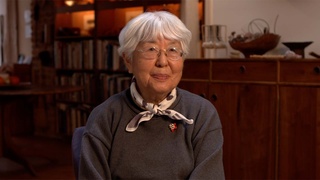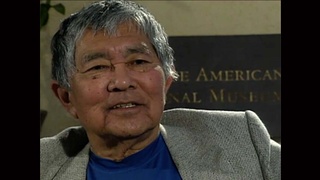Interviews
State Department records show concern for treatment of Japanese American internees
When you look through State Department records, especially, you will discover that the State Department was very concerned about how Japanese Americans were treated here because Imperial Japan would find out about it and they could mistreat prisoners, who were American, who they were holding. And so it would be a tit-for-tat situation. And the State Department was very interested and concerned that Japanese nationals and Japanese Americans here [in the U.S.] be treated decently so that Americans held as prisoners and internees by Imperial Japan would be treated decently. So [the] State Department would never have allowed and, therefore, get word to [Henry L.] Stimson, Secretary of War, [would not have] allowed anything like that to happen.
There’s even a letter that Michi has published in her book—it’s a Stimson letter— talking about possible reprisals, threatening Japan that the they could do something to us [who were in the camps] if they [Japan] did not treat Americans right. There was a tremendous concern [by top level government officials that] so it would not have happened. In other words, the camps, we would not have been forcibly, by the point of bayonet, been forced into the camps. I am positive of that.
Date: August 26, 1998
Location: Virginia, US
Interviewer: Darcie Iki, Mitchell Maki
Contributed by: Watase Media Arts Center, Japanese American National Museum
Explore More Videos

Father was convinced the constitution would protect him
(b. 1935) Sansei businessman.

The lack of discussion about family’s incarceration in Amache
Sansei judge for the Superior Court of Los Angeles County in California


Her brother’s reasons as a No-No Boy
(b. 1923) Japanese American poet, activist

Her grandfather was pressured to teach Japanese
Sansei judge on the Superior Court of Los Angeles County in California

Neighbor took care of her mother after grandfather was taken by FBI
Sansei judge on the Superior Court of Los Angeles County in California

Immediately after the bombing
(b. 1938) Japanese American. Hiroshima atomic bomb survivor

Other family members not as lucky
(b. 1938) Japanese American. Hiroshima atomic bomb survivor

His parents had little hope that he had survived the atomic bomb
(b. 1938) Japanese American. Hiroshima atomic bomb survivor

His views on nuclear weapons
(b. 1938) Japanese American. Hiroshima atomic bomb survivor

Loss When Leaving for Manzanar
Japanese American animator for Walt Disney and Hanna Barbera (1925-2007)

Forcibly deported to the U.S. from Peru
(b. 1936) Japanese Peruvian incarcerated in Crystal City

Stories of Grandfather at a concentration camp in Fusagasuga
(b.1974) Japanese Colombian who currently resides in the United States

Her grandfather in a concentration camp in Fusagasuga (Spanish)
(b.1974) Japanese Colombian who currently resides in the United States

Family welcomed at Crystal City
(b. 1936) Japanese Peruvian incarcerated in Crystal City
